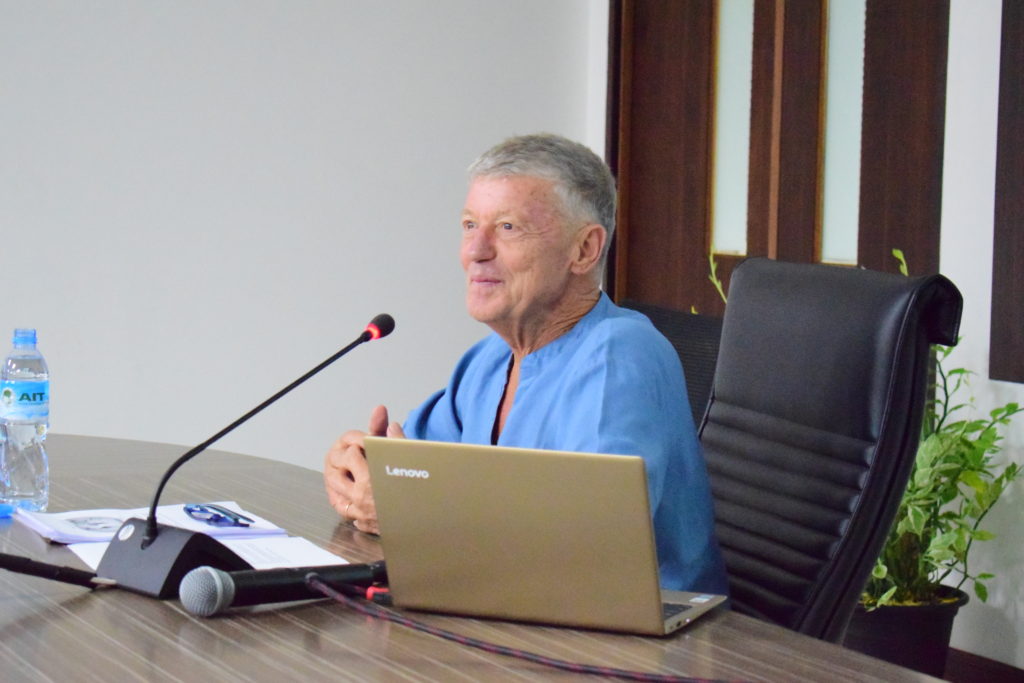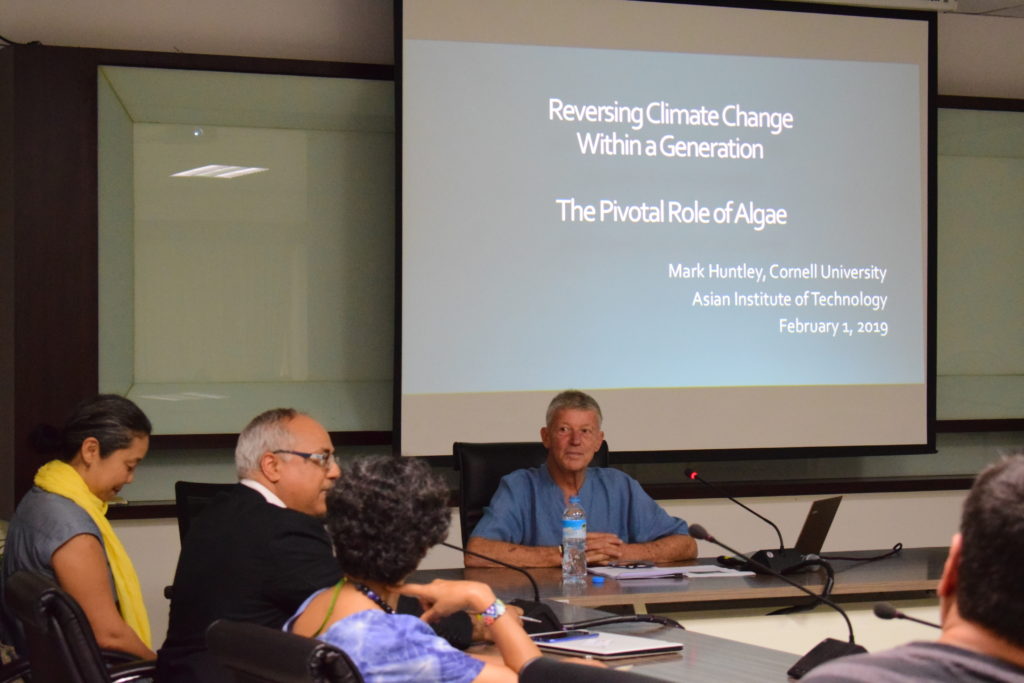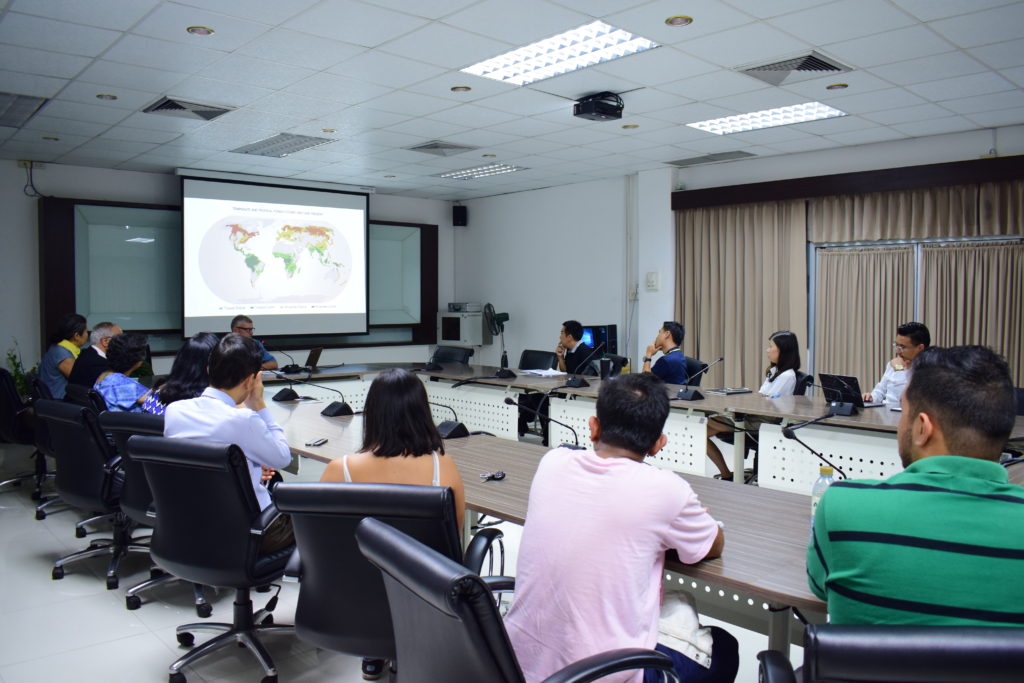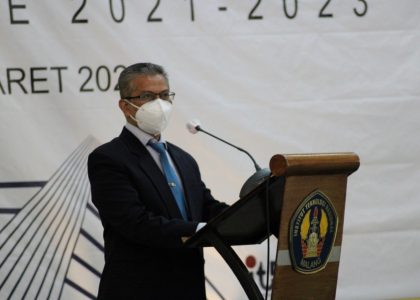Dr. Mark Huntley, a visiting scholar at Cornell University delivered a seminar on Reversing Climate Change within a Generation – The Pivotal Role of Algae at the Asian Institute of Technology on Friday 1 February 2019.
Speaking at the seminar, Mark said that our pursuit for better life enabled many discoveries, but it also gave us climate change. “Since 1980 we’ve added 200 trillion gigajoules of heat to the ocean – one billion times the heat energy of the atom bombs dropped on Hiroshima and Nagasaki. Equal to one atomic explosion every few seconds.” he added. “Climate Change is real and is caused by homo sapiens” he reiterated.
Backed by his statistical data, Mark explained how it is possible to reverse climate change and improve the quality of life on earth using proven technologies and practices. We can do that by replacing the fossil fuels with renewable energy. “Fossil fuels are doomed. They can’t compete on price. They can’t compete on energy return. And they certainly can’t compete on emissions. Renewables win the marketplace.” Mark said. We can start by using electric vehicles, solar roofs and planting trees while reaching out to the politicians and policy makers on how we can save this planet.
His proposed solutions focus on diversifying the use of microalgae. While the trend in burning fossil fuel-powered cars are just starting, the other half of the transport such as trucks, ships and airplanes can’t go electric. Biofuels are the only solution and microalgae is to the rescue. His talk uplifted the spirit of hope and optimism among the audience.
You can find his presentation slide here.
About the Speaker:
Mark Huntley, PhD (Biological Oceanography, Dalhousie University 1980) is Research Biologist, University of Hawaii Hilo (2015-present); Visiting Scholar, Biological and Environmental Engineering and Department of Animal Sciences, Cornell University (2011-present); and Adjunct Professor, Nicholas School of the Environment, Duke University (2013-present). Dr. Huntley served on the faculty at Scripps Institution of Oceanography, UCSD (1982-1998) and the Department of Oceanography, University of Hawaii, Manoa (1998-2011).
Mark has dedicated his career to understanding and reversing climate change. He is now speaking worldwide on a comprehensive plan for achieving zero carbon emissions by 2040. He has focused his research on studying the impact of climate change and on the development of algal biotechnology. He served for 10 years (1992-2002) on the executive committee of GLOBEC, the only component of the International Geosphere-Biosphere Programme (IGBP) to study the impact of climate change on marine ecosystems. He led four Antarctic research expeditions (1986-1992). He has led two companies: Aquasearch (1988 -2002), which developed astaxanthin as a human nutritional supplement, and Cellana BV (2007-2011), a $200 million joint venture with Royal Dutch Shell that developed and demonstrated algae biofuel and co-product production at the highest rates reported to date. He served as Principal Investigator of the Cornell Marine Microalgae Biofuels Consortium (2009-2015) and is now Co-PI of the Marine Algae Industrialization Consortium, MAGIC (2015-present), both projects aimed at commercializing biofuels and animal feed protein from algae, and funded by the US Department of Energy. He has published >80 peer reviewed articles and several patents.
Read more about his current projects here and more about Mark here.
Abstract:
Our pursuit of a better life, enabled by the discovery of fire, agriculture, and fossil fuels, gave us modern civilization. It also gave us climate change. We can reverse climate change and improve the quality of life on earth using proven technologies and practices – all of which can be brought to scale by 2040 – that reduce CO2 emissions to zero and remove CO2 from the atmosphere.
All demand for electricity in 2040 can be satisfied by renewables. Renewable electricity is already cheaper and more energy efficient than fossil fuels – that’s why it’s winning in the marketplace. By 2030, most energy storage systems will deliver energy at $0.05-$0.10/kWh, which is competitive with fossil fuels. That solves the grid continuity problem. Emissions fall to near zero.







